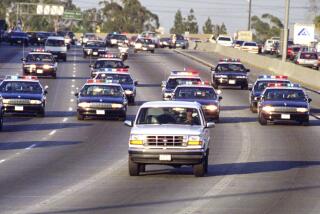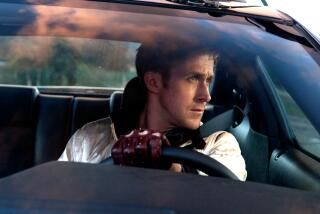Cops commandeer a civilian car? Let’s cut to the chase
When counterterrorism agent Jack Bauer, the hero of the television show “24,” needs a car to chase a terrorist around Los Angeles, he simply pulls out a gun and orders the nearest motorist out of his or her vehicle.
Bauer gets behind the wheel and starts a high-speed chase, usually while making a cellphone call to headquarters. A few minutes later, the car has been driven over curbs and through barriers, shot up and crashed several times.
When Bauer is finished, he abandons the car and the show moves on. How do you explain that to your leasing agent?
Such a story line is hardly new. Police and special federal agents have been confiscating civilian vehicles in movies and television shows for decades.
But does this really happen, an authorized carjacking by law enforcement authorities?
“I have never heard of anyone doing that in my 16 years with the agency,” said Steve Kodak, an FBI agent in Washington, D.C., who is currently assigned to the agency’s public affairs unit. “They have been showing cops doing that for years. It makes for good movies.”
“We all laugh,” Kodak added. “The reason you wouldn’t do it is the liability issues. The legal liabilities would be so large.”
With all the additional law enforcement authority granted since Sept. 11, you’d think officers would have the right to grab any car they want. But listening in on a private telephone conversation is one thing. Apparently, taking somebody’s prized Buick is another.
In any case, FBI agents usually travel in packs, Kodak said. If anybody were going to need to commandeer a car for a chase, it would probably be local police.
So it must happen in city police departments? No, said Jackie Bezart, an officer at the Long Beach Police Department.
“I have only seen that in the movies,” Bezart said. “I have never heard of it actually happening. It certainly wouldn’t be a normal practice. There are so many things that could go wrong. What is the condition of the car? Is there gas in it?”
True enough, Bauer has never run out of gas after having jacked a car. But are police actually forbidden from doing it? Even Bezart wasn’t sure whether there was written policy on the matter. “Sometimes, you just have to rely on common sense.”
Of course, common sense can work both ways.
Sgt. Lee Sands, a spokesman for the Los Angeles Police Department, said bluntly that commandeering civilian cars “just doesn’t happen.”
“I have been around for 23 years and I have never heard where we have had to commandeer a car,” Sands said. But Sands did recall something similar happening one time. In the 1997 North Hollywood bank robbery shootout, police found a civilian armored truck to use as a bulletproof barricade.
“You can say we commandeered that,” Sands added. “Each situation is taken on its own merit.”
In that shootout, two bank robbers were wearing heavy body armor and assaulting police with high-caliber automatic weapons. The incident pointed up the need for some better protection for police and by 2003, the force had an armored 14-ton SWAT truck.
FBI Agent Scott Garriola, based in the agency’s Los Angeles office, is closer to a real-life Jack Bauer than Kiefer Sutherland, who plays the character. He specializes in running down fugitives, having made more than 400 collars. Garriola knows that things often go wrong on the streets, like dead batteries in stakeout cars, flat tires, trash trucks that get in the way of an easy grab and accidents. But having to commandeer a civilian car at gun point hasn’t been one of them.
“You do that in Los Angeles and somebody is bound to shoot back at you, particularly in the neighborhoods where we work,” Garriola said.
So, the next time you see a person holding a gun and ordering a person out of a car, it is probably not a federal agent or local cop, but a criminal with a desperate need for money.
A real carjacking is not all that unusual anymore. A Justice Department survey published in 2004 reported that there are 38,000 carjackings per year. A weapon was used in 74% of the cases, usually a gun.
In the movie “Grand Canyon,” about the gritty reality of life in Los Angeles, a character played by actor Steve Martin gets carjacked and shot in the leg. Now that seems to be reality.
*
More to Read
Sign up for Essential California
The most important California stories and recommendations in your inbox every morning.
You may occasionally receive promotional content from the Los Angeles Times.











